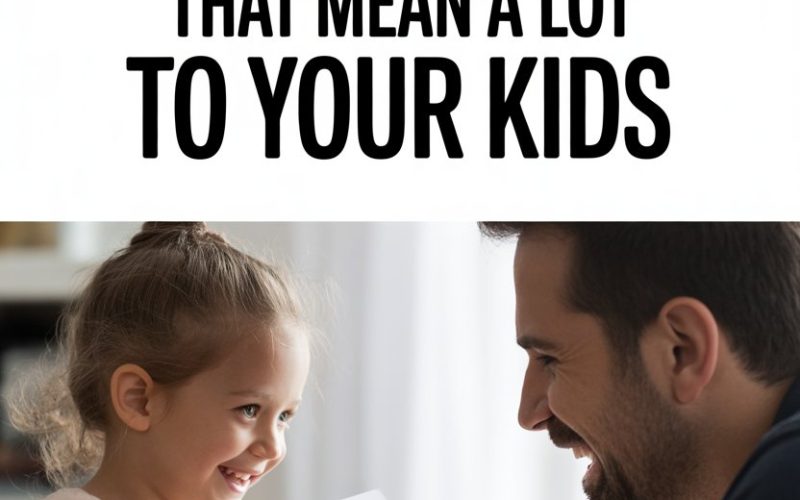Blink and you’ll miss it: the moment your child beams at you because you remembered their favourite colour, or the way they sneak a cookie into your hand to share.
Kids are complicated little creatures, but what fills up their love tanks often isn’t the grand gestures or expensive outings. It’s the small, everyday actions—the stuff you barely notice until you see their faces light up.
Ready to make their day? Here are 30 little things that mean a whole lot to your kids (and don’t require spreadsheets, glitter explosions, or a second mortgage).
1. Listening Without Your Phone in Sight
When you put your phone down, and really tune in, kids can tell.
They may not thank you now (or ever), but research from the American Psychological Association shows that undivided attention strengthens emotional bonds. Plus, who actually enjoys competing with Instagram for affection?
2. Letting Them Make a Mess
Grown-ups see a disaster zone. Kids see a masterpiece in the making. Allowing them to paint outside the lines (and sometimes on the table) sends a message that their creativity matters—clean-up be damned.
3. Saying Yes to Silly Ideas
Breakfast for dinner? A dance party before bath time? Saying yes sometimes, even if it’s a bit bonkers, gives kids a sense of agency. And honestly, who doesn’t love pancakes after sunset?
4. Remembering Their Favourite Stories
Re-reading the same picture book for the 57th time isn’t just about plot twists. When you recall their favourite lines or characters, they know you care about what’s important to them—even if it’s that one Disney dog again.
5. Noticing the Little Things They Do Well
Everyone loves applause, especially pint-sized humans. Catch them being kind, sharing, or even just remembering to hang up their backpack. Point it out, and watch their tiny chests puff up with pride.
6. Leaving Notes in Lunchboxes
A squiggly smiley face, a secret joke, or a “good luck on your spelling bee!” note is a midday hug from home. No need for calligraphy—stick figures totally count.
7. Giving Them Your Hand to Hold
Whether you’re crossing a busy street or walking to the letterbox, offering your hand is an unspoken “I’ve got you.” It’s a comfort they’ll remember, long after they pretend they’re too big for it.
8. Laughing at Their Jokes (Even the Terrible Ones)
Knock-knock jokes that make no sense are a childhood rite of passage. Fake a laugh if you must. They’re not auditioning for stand-up at the Apollo; they just want you in on the fun.
9. Letting Them Teach You Something
Ask them to show you how to do that new dance move, or let them explain what “Minecraft” is (again). Kids love being the expert for once—just prepare for wildly inaccurate life lessons.
10. Apologising When You’re Wrong
No one expects parents to be perfect, least of all your kids. Saying “I’m sorry” teaches humility and shows them that everyone messes up—which is oddly comforting when you’re six.
11. Saying “I Love You” Out Loud
Never underestimate the power of those three little words, even if you’ve already said them 12 times today. Verbal reassurance is like emotional sunscreen—it never hurts to reapply.
12. Cheering Them On from the Sidelines
Whether it’s a football match or a school play, your presence matters. You don’t have to know the rules, just clap (loudly) and maybe bring snacks. The important part is that you showed up.
13. Letting Them Pick the Movie
It might mean sitting through singing trolls or yet another superhero flick, but letting them choose gives them a tiny taste of control. Who knows—you might even discover you’re a closet fan.
14. Sharing Your Favourite Childhood Stories
Telling them about the time you stuck a marble up your nose or got grounded for sneaking biscuits shows them you weren’t always a responsible adult. They love knowing you were once a kid—with equally questionable judgement.
15. Celebrating the Weird Holidays
National Ice Cream Day? Backwards Shirt Day? Why not? Kids love an excuse to be silly, and you might start a family tradition that’s more memorable than Halloween.
16. Giving Compliments Beyond Looks
Tell them how clever, thoughtful, or brave they are. Compliments that focus on character and effort help build self-esteem, according to child psychologists at the University of Washington.
17. Eating Meals Together (Even If It’s Just Toast on the Run)
Family meals are about connection, not cuisine. Whether it’s a full roast or cheese sandwiches, sharing food fosters belonging—no fancy table settings required.
18. Turning Chores into Games
No child ever leapt for joy at the words “clean your room.” But a two-minute tidy-up race? Game on. Bonus: you’ll get to witness Olympic-level sock sorting.
19. Giving Them a Special Task
Handing over the “official” job of setting the table or feeding the goldfish gives kids a sense of purpose. Sprinkle in some praise, and you’ll see their confidence bloom.
20. Saying Yes to Bedtime Snuggles
Even on nights when your to-do list is longer than a giraffe’s neck, a few minutes of cuddles at bedtime help kids feel safe and loved. And for you? Built-in stress relief.
21. Letting Them Hear You Brag About Them
Say something nice about your child within earshot, whether it’s to Grandma, your partner, or the dog. Kids thrive on overheard praise—just don’t lay it on so thick they start to suspect sarcasm.
22. Keeping Promises (Even Small Ones)
If you say you’ll play a game after dinner or read just one more chapter, stick to it. Reliability is the foundation of trust, even if it’s only about “Go Fish.”
23. Showing Interest in Their Day (Even the Boring Bits)
Ask about the best part and the worst. Listen to the saga of the missing pencil case, the triumph of the spelling test, the injustice of broccoli at lunch.
24. Letting Them Wear That Ridiculous Outfit
Polka dot leggings with a superhero cape? Sure. As long as it’s weather-appropriate, letting kids express themselves through clothing is a harmless way for them to assert independence.
25. Being Silly Together
Make faces in the mirror, have a tickle war, do your best chicken dance. When you act goofy, you’re showing them it’s okay not to take life (or yourself) too seriously.
26. Saying Thank You (and Meaning It)
Manners are more than magic words; they’re a sign of respect. Thank your child when they help, share, or even just for being them. Gratitude is contagious.
27. Admitting You Don’t Know Everything
When your child asks why the sky is blue or how Wi-Fi works, it’s fine to say “I’m not sure, but let’s find out together.” You’re giving permission to be curious, and to learn alongside them.
28. Giving Them Time to Just Be
Not every moment needs to be filled with activities or learning opportunities. Some of the best memories come from doing “nothing”—building a pillow fort, lying on the grass, or just pottering about.
29. Taking Their Worries Seriously
When worries look pint-sized to adults, they can feel enormous to kids. Listen, empathise, and avoid the urge to fix everything. Feeling heard is sometimes all they need.
30. Showing Up—for the Small Stuff
It’s not just about birthdays and sports days. Being there for tooth fairy visits, lost shoes, or sharing a laugh over dinner tells your child: you’re a constant in their world.
The Magic in the Margins
Some days, you’ll feel like you’re muddling through, unsure if those little acts are making a difference.
Spoiler: They are.
Kids may not always say it, but these moments add up to a childhood that feels warm, safe, and loved.
And one day, long after the knock-knock jokes and mismatched socks, they’ll remember the little things that meant the most.
Turns out, the secret to being a “good enough” parent isn’t keeping up with the Joneses. It’s small, simple gestures that whisper: “You matter.”
Don’t underestimate your superpowers—one silly dance or lopsided sandwich at a time.




